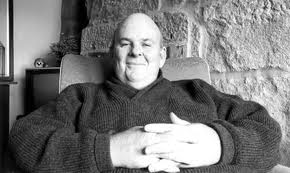POETRY MONTH 30/30/30: Inspiration, Community, Tradition: DAY 17:: Jim Lounsbury on Les Murray
 POETRY : A DREAM SEA OF WORDS by Jim Lounsbury
About ten years ago, I stumbled into a heated debate with a filmmaker friend about whether words or imagery was a more effective way to convey emotion. I argued the case for words, and he took the side of imagery. As the disagreement escalated to a passionate squabble and then to a stamp your feet and beat on your chest free-for-all, I began to wonder what gave me such a strong opinion on the issue. We were both filmmakers. We were both avid photographers. We were both working in the visual arts. What then, was my problem with accepting the visual medium as the superior art form? At the end of the night, we agreed to disagree, and I left, still confused about why I was so confident in the power of words.
Of course, my affinity for words could be biological. My internal chemistry set might not react to imagery as powerfully as it does to a well placed noun, but I wasn't going to let myself off the hook that easily. Over the course of many months, my thoughts often returned to this argument until a plausible explanation finally struck me a few weeks later. Imagery was powerful at evoking emotion, but words have the ability to surgically cut to the bone and identify a precise emotion.
POETRY : A DREAM SEA OF WORDS by Jim Lounsbury
About ten years ago, I stumbled into a heated debate with a filmmaker friend about whether words or imagery was a more effective way to convey emotion. I argued the case for words, and he took the side of imagery. As the disagreement escalated to a passionate squabble and then to a stamp your feet and beat on your chest free-for-all, I began to wonder what gave me such a strong opinion on the issue. We were both filmmakers. We were both avid photographers. We were both working in the visual arts. What then, was my problem with accepting the visual medium as the superior art form? At the end of the night, we agreed to disagree, and I left, still confused about why I was so confident in the power of words.
Of course, my affinity for words could be biological. My internal chemistry set might not react to imagery as powerfully as it does to a well placed noun, but I wasn't going to let myself off the hook that easily. Over the course of many months, my thoughts often returned to this argument until a plausible explanation finally struck me a few weeks later. Imagery was powerful at evoking emotion, but words have the ability to surgically cut to the bone and identify a precise emotion.
Announcing: The AWESOME CREATOR Series
 Who is an awesome creator?
Why... YOU are!
It's still Poetry Month, and we at Exit Strata have been largely focused on that discipline, with our invitational 30/30/30 Inspiration, Community, Tradition posts.
However, we want to stress that we love and are inspired by *all* creative disciplines -- in fact, that this big love is why we are here. The primary intention behind using our virtual home as a portal for not only for content but for people is to bring together creators from all mediums: a reminder that we are more alike than we are different.
Who is an awesome creator?
Why... YOU are!
It's still Poetry Month, and we at Exit Strata have been largely focused on that discipline, with our invitational 30/30/30 Inspiration, Community, Tradition posts.
However, we want to stress that we love and are inspired by *all* creative disciplines -- in fact, that this big love is why we are here. The primary intention behind using our virtual home as a portal for not only for content but for people is to bring together creators from all mediums: a reminder that we are more alike than we are different.
FICTION: Gardens by David Meiklejohn [excerpt]
POETRY MONTH 30/30/30 : Inspiration, Community, Tradition : DAY 10 :: Sarah Pinder on Libby Scheier
 I encountered Libby Scheier’s work for the first time in my late teens, when I first moved to Toronto. It was a perfectly synchronous moment – I was so hungry for directness, and Scheier serves it up in spades. I devoured everything of hers I could get my hands on, treating the collections as guidebooks on possible routes to the places I wanted to go in my own work. She wrote so angry, and so tender, and candidly addressed relationships, violence and agency in ways that are paint-strippingly clear.
I encountered Libby Scheier’s work for the first time in my late teens, when I first moved to Toronto. It was a perfectly synchronous moment – I was so hungry for directness, and Scheier serves it up in spades. I devoured everything of hers I could get my hands on, treating the collections as guidebooks on possible routes to the places I wanted to go in my own work. She wrote so angry, and so tender, and candidly addressed relationships, violence and agency in ways that are paint-strippingly clear.
POETRY MONTH 30/30/30: Day 6 :: Matthew Nelson and Jacob Perkins on Paul Legault
Interview with the Self by Jacob Perkins & Matt Nelson Q: In what way has Paul Legault improved your sex life? A: It’s a tough question. We’d like to point out that we didn’t get into sir Legault on our own. Like any good relationship it takes, at the very least, two. Our friend read from his book in the subway and all she had to say was, “This guy will turn you inside out,” which he of course didn’t. No one can do that to you and if they try, you should call the proper MTA authorities. But he did turn us outside in, as in what the ufkc? His poems trick you into thinking you’re reading multiple voices shouting in a space where shouts can echo, colliding with each other and creating new sounds. But the intellectual gift is that all the voices are thrown. There is only one Wizard in this Oz. Legault takes control of your equilibrium and maintains a kind of trustless navigation that is impossible to follow on first read. Q: What method of Paul Legault’s language turns you on and why? A: Well, if you are one of those who can pick out patterns, Mr. Legault, at least in The Other Poems, which, by the way is titled on the sub-title tacked to most collections of poetry, sticks pretty close to what we would describe as a format. In our own work the format relies on a series of folds (literal) which we attack as a unit, one space at a time, passing our work back and forth without verbal cooperation. This results in a timing based on mutual challenge and uncomfortability. It is unpredictable but refreshing, the rhythm. Paul (can we call him Paul?) discomforts the supposition that what you read before was what was you read before. Every line, every word is a question game. When did the adjective turn into a noun? How can time be turned into space with just the tiniest turn of a preposition? These are the types of strange knife twists Paul manipulates causing a poetry hemorrhage, showing you the insides of words.
A Beautiful Marsupial Afternoon: CA Conrad, Animation by Luca Dipierro
Exit Strata is very pleased to preview for you the darkly whimsical, wonderful animation Luca Dipierro made in collaboration with Philadelphia's friend to poets everywhere, CA Conrad, in celebration of Conrad's new book, A Beautiful Marsupial Afternoon, forthcoming from Wave. Music
Internet Treasure Hunting: FLAME – Waldman/Bye
Waldman/Bye word/sound/video collaboration, FLAME, based on Aristophenes' Speech on Love, from Plato's Symposium
Notes on Biology
"Notes on Biology" is an award-winning animation from our friends at Ornana Films.




